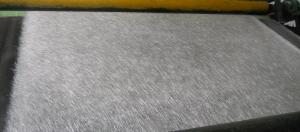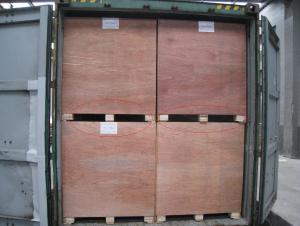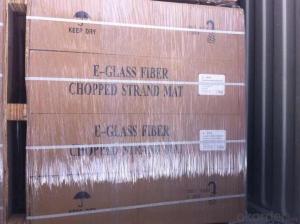Powder Binder E glass Chopped Strand Mat for Fixed Table Lamination
- Loading Port:
- China Main Port
- Payment Terms:
- TT or LC
- Min Order Qty:
- 1000 kg
- Supply Capability:
- 500000 kg/month
OKorder Service Pledge
OKorder Financial Service
You Might Also Like
Product description of Powder Binder E glass Chopped Strand Mat for Fixed Table Lamination
Powder Binder E glass Chopped Strand Mat for Fixed Table Lamination is an unwoven fabrics consisting of randomly distributed chopped strands held together with powder binder.
Powder Chopped Strand Mats are compatible with unsaturated polyester, vinyl ester, phenol and epoxy resins.
This product is special designed and produced for the FRP sheet/panel fixed table lamination. The typical end-use applications include various Gel-coat panels and sheet, the end application is for the cold warehouse, cold trucks body etc.
Specification of Powder Binder E glass Chopped Strand Mat for Fixed Table Lamination
Property | Glass type | Weight(g/m2) | Width 200~3300 | Roll Weight | Moisture Content /% | Combustible Content /% | Breakage Strength /N |
Test Method | GB/T 1549 | ISO3374:2000 | ISO3374 | GB/T17470-1998 | ISO3344:1997 | ISO1887:1995 | ISO3342 |
EMC 250 | E-GLASS | 225±22 | ±5 | 6~150 | <0.2 | 5.0±0.6 | ≥150 |
EMC 300 | E-GLASS | 300±30 | ±5 | 6~180 | <0.2 | 4.0±0.6 | ≥190 |
EMC 375 | E-GLASS | 375±37 | ±5 | 6~180 | <0.2 | 4.0±0.6 | ≥200 |
EMC 450 | E-GLASS | 450±45 | ±5 | 6~180 | <0.2 | 3.8±0.6 | ≥200 |
Characteristics of Powder Binder E glass Chopped Strand Mat for Fixed Table Lamination
1.Uniform density ensures consisttent fiberglass content and mechanical properties of the composites products;
2.Uniform powder distribution ensures good mat integrity, little loose fibers and small roll diameter;
3.Fast and consistent wet-out speed in resins and rapid air lease reduce resin consumption and production cost, and enhances productivity and mechanical properties of the end products.
4, The composite products have high dry and wet tensile strength and good transparency.
5, High strength with stiff mat for panel laminating.
Package:
1, the Mat roll will be wrapped in PVC/PE film, and then packed in wooden boxes, fasten by steel strip outside of the wooden boxes;
2, Horizontally placed in wooden boxes:
3 rolls*3rolls
There are isolated beams between the roll layers to protect the mat from damage.
FAQ:
1. Why Choose us?
CNBM is a stated owned company, provide the guarantee for the best quality, best service and safety business.
2. How will we guarantee the quality?
a, ISO 9001-2008 quality control system;
b, Strict and regular quality control in production;
c, Inspeciation when loading into container before shippment;
d, Sample stock for one year for quality tracing and record.
3. What is your MOQ?
Our MOQ is one pallet.
4. Can you provide sample?
Yes, samples are in stock. we can offer free sample for you.
5. Payment terms?
We can accept L/C, T/T etc.
6. Do you offer OEM service?
Yes, we can print customers’ logo on the packaging;
And the size and specification can be produced and design according to your demand.
7. What is the Production Lead Time?
1 *40HQ each day.
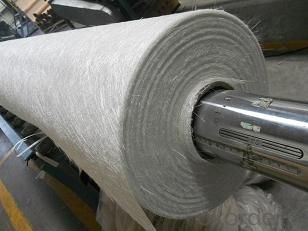
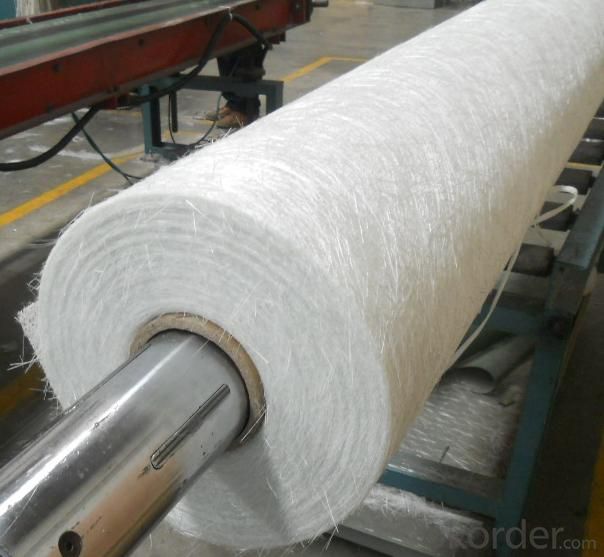
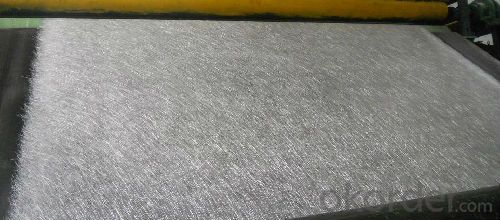
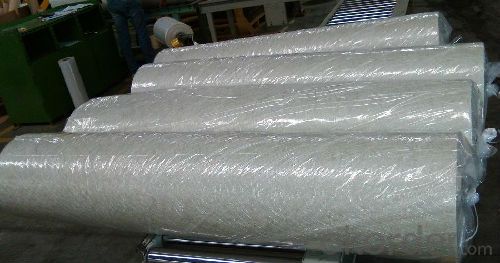
- Q:Can fiberglass mat tissue be used for reinforcement in composites?
- Fiberglass mat tissue, composed of glass fibers randomly arranged, can reinforce composites. It is frequently utilized in the manufacturing of composites to enhance their strength. By combining the mat tissue with resin, a sturdy and durable composite material can be created. The random orientation of the fibers contributes to the composite structure's strength and reinforcement in multiple directions. Moreover, the mat tissue's flexibility allows for easy layering and molding into intricate shapes, making it suitable for a range of applications in industries like automotive, aerospace, construction, and marine. In conclusion, fiberglass mat tissue is extensively employed and highly effective as a reinforcement material in composites.
- Q:How long does fiberglass mat tissue last?
- The lifespan of fiberglass mat tissue can vary depending on various factors such as its quality, usage, and exposure to external conditions. Generally, fiberglass mat tissue is designed to be highly durable and long-lasting. When properly installed and maintained, it can typically last for several decades. However, it is important to note that fiberglass mat tissue can deteriorate over time due to environmental factors such as UV exposure, moisture, and temperature fluctuations. Continuous exposure to harsh weather conditions, extreme temperatures, or chemicals can accelerate the degradation process. To maximize the lifespan of fiberglass mat tissue, it is crucial to follow the manufacturer's guidelines for installation, maintenance, and periodic inspections. Regular inspections can help identify any signs of wear, damage, or degradation early on, allowing for timely repairs or replacements. It is recommended to consult with a professional or the manufacturer for specific information regarding the expected lifespan of a particular fiberglass mat tissue, as it can vary depending on the specific product and its intended application.
- Q:Does fiberglass mat tissue provide any mold resistance?
- Fiberglass mat tissue does not inherently provide mold resistance. However, it can contribute to mold prevention when used in conjunction with other mold-resistant materials and proper construction practices. The fiberglass mat tissue itself is not resistant to mold growth, but it can be used as a reinforcement layer in mold-resistant building materials, such as mold-resistant drywall or sheathing. These materials are designed to resist mold growth by incorporating additives or coatings that inhibit the growth of mold and mildew. Additionally, it is important to ensure proper installation and maintenance of these materials to minimize moisture buildup and create a less favorable environment for mold growth.
- Q:Can fiberglass mat tissue be used for reinforcing pipes?
- Yes, fiberglass mat tissue can be used for reinforcing pipes. Fiberglass mat tissue is made of fine glass fibers that are randomly oriented, giving it excellent strength and flexibility. This makes it an ideal material for reinforcing various structures, including pipes. When applied to the surface of a pipe, the fiberglass mat tissue helps to increase its overall strength and durability, preventing cracks and leaks. Additionally, fiberglass mat tissue is resistant to corrosion, making it suitable for use in pipes that carry corrosive substances. Overall, fiberglass mat tissue is a reliable choice for reinforcing pipes and ensuring their long-term performance.
- Q:Can fiberglass mat tissue be used for insulation in power generation facilities?
- Yes, fiberglass mat tissue can be used for insulation in power generation facilities.
- Q:Can fiberglass mat tissue be used for making lightweight automotive parts?
- Yes, fiberglass mat tissue can be used for making lightweight automotive parts. Fiberglass mat tissue is a lightweight, versatile material that is commonly used in the manufacturing of automotive parts. It offers excellent strength-to-weight ratio, making it ideal for producing lightweight components without compromising on durability and performance. Additionally, fiberglass mat tissue can be easily molded into various shapes, allowing for complex designs and customization in automotive parts. Moreover, it provides good resistance to corrosion, chemicals, and temperature fluctuations, further enhancing its suitability for automotive applications. Overall, fiberglass mat tissue is a reliable and cost-effective choice for creating lightweight automotive parts.
- Q:Can fiberglass mat tissue be used for acoustic insulation?
- Yes, fiberglass mat tissue can be used for acoustic insulation. It is a commonly used material for soundproofing due to its ability to absorb and dampen sound waves. Its high density and fibrous structure make it effective in reducing noise and improving acoustic performance in buildings, vehicles, and other applications.
- Q:What is the expected lifespan of fiberglass mat tissue in power generation applications?
- The expected lifespan of fiberglass mat tissue in power generation applications can vary depending on various factors such as the specific application, environmental conditions, and maintenance practices. However, fiberglass mat tissue is known for its durability and longevity, making it a popular choice for power generation applications. In general, fiberglass mat tissue can have an estimated lifespan of 20 to 30 years in power generation applications. This is due to its excellent resistance to corrosion, heat, and chemicals, which are commonly encountered in power generation facilities. Fiberglass mat tissue is also capable of withstanding high mechanical stress and can retain its structural integrity over a long period of time. However, it is important to note that the lifespan can be influenced by factors such as exposure to extreme temperatures, humidity, and chemicals, as well as the frequency and quality of maintenance and inspections. Regular inspections and proper maintenance can significantly extend the lifespan of fiberglass mat tissue in power generation applications. It is recommended to consult with manufacturers and industry experts to determine the specific expected lifespan of fiberglass mat tissue based on the particular power generation application and operating conditions.
- Q:How does fiberglass mat tissue perform in terms of thermal expansion?
- Fiberglass mat tissue has a relatively low thermal expansion coefficient, meaning it expands minimally when exposed to heat. This characteristic makes it an excellent material for applications where thermal stability is crucial. The tightly woven structure of fiberglass mat tissue helps to limit the expansion and contraction of the material, even under high temperatures. Consequently, it exhibits excellent dimensional stability and resistance to thermal stresses. This property allows fiberglass mat tissue to maintain its structural integrity when exposed to extreme temperature variations, making it highly suitable for use in industries such as aerospace, automotive, and construction, where thermal expansion and contraction can pose significant challenges.
- Q:Is fiberglass mat tissue resistant to compression?
- Yes, fiberglass mat tissue is resistant to compression.
1. Manufacturer Overview |
|
|---|---|
| Location | |
| Year Established | |
| Annual Output Value | |
| Main Markets | |
| Company Certifications | |
2. Manufacturer Certificates |
|
|---|---|
| a) Certification Name | |
| Range | |
| Reference | |
| Validity Period | |
3. Manufacturer Capability |
|
|---|---|
| a)Trade Capacity | |
| Nearest Port | |
| Export Percentage | |
| No.of Employees in Trade Department | |
| Language Spoken: | |
| b)Factory Information | |
| Factory Size: | |
| No. of Production Lines | |
| Contract Manufacturing | |
| Product Price Range | |
Send your message to us
Powder Binder E glass Chopped Strand Mat for Fixed Table Lamination
- Loading Port:
- China Main Port
- Payment Terms:
- TT or LC
- Min Order Qty:
- 1000 kg
- Supply Capability:
- 500000 kg/month
OKorder Service Pledge
OKorder Financial Service
Similar products
New products
Hot products
Related keywords
